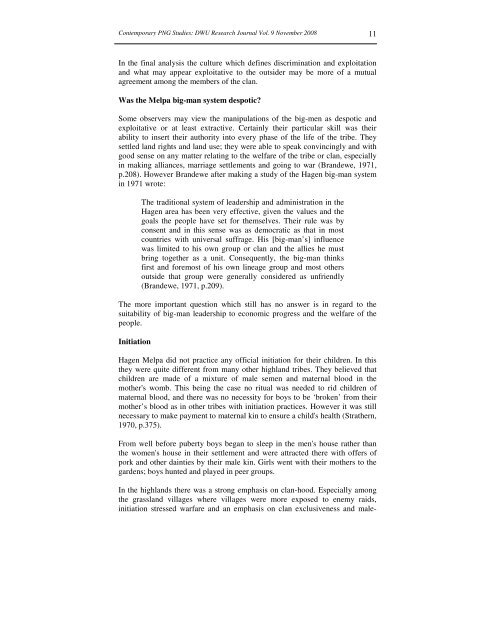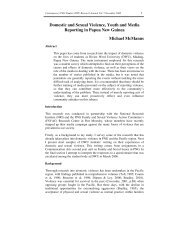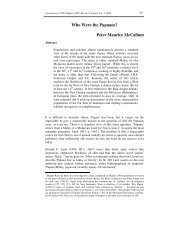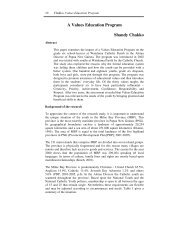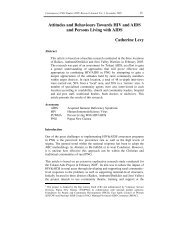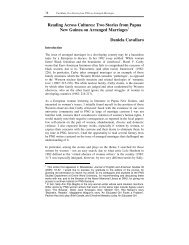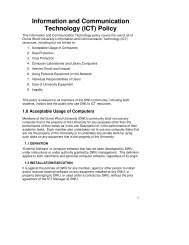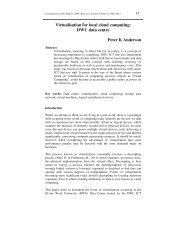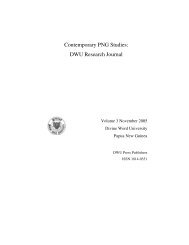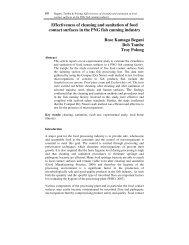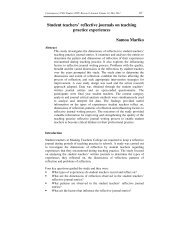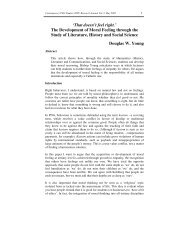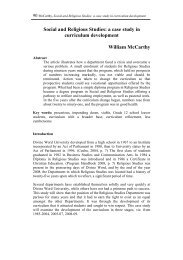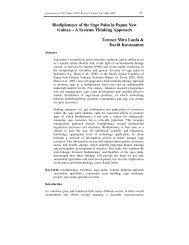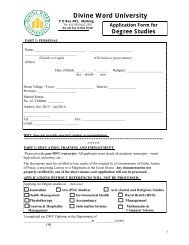A short study of Melpa rehistory - Divine Word University
A short study of Melpa rehistory - Divine Word University
A short study of Melpa rehistory - Divine Word University
- No tags were found...
You also want an ePaper? Increase the reach of your titles
YUMPU automatically turns print PDFs into web optimized ePapers that Google loves.
Contemporary PNG Studies: DWU Research Journal Vol. 9 November 2008 11In the final analysis the culture which defines discrimination and exploitationand what may appear exploitative to the outsider may be more <strong>of</strong> a mutualagreement among the members <strong>of</strong> the clan.Was the <strong>Melpa</strong> big-man system despotic?Some observers may view the manipulations <strong>of</strong> the big-men as despotic andexploitative or at least extractive. Certainly their particular skill was theirability to insert their authority into every phase <strong>of</strong> the life <strong>of</strong> the tribe. Theysettled land rights and land use; they were able to speak convincingly and withgood sense on any matter relating to the welfare <strong>of</strong> the tribe or clan, especiallyin making alliances, marriage settlements and going to war (Brandewe, 1971,p.208). However Brandewe after making a <strong>study</strong> <strong>of</strong> the Hagen big-man systemin 1971 wrote:The traditional system <strong>of</strong> leadership and administration in theHagen area has been very effective, given the values and thegoals the people have set for themselves. Their rule was byconsent and in this sense was as democratic as that in mostcountries with universal suffrage. His [big-man’s] influencewas limited to his own group or clan and the allies he mustbring together as a unit. Consequently, the big-man thinksfirst and foremost <strong>of</strong> his own lineage group and most othersoutside that group were generally considered as unfriendly(Brandewe, 1971, p.209).The more important question which still has no answer is in regard to thesuitability <strong>of</strong> big-man leadership to economic progress and the welfare <strong>of</strong> thepeople.InitiationHagen <strong>Melpa</strong> did not practice any <strong>of</strong>ficial initiation for their children. In thisthey were quite different from many other highland tribes. They believed thatchildren are made <strong>of</strong> a mixture <strong>of</strong> male semen and maternal blood in themother's womb. This being the case no ritual was needed to rid children <strong>of</strong>maternal blood, and there was no necessity for boys to be ‘broken’ from theirmother’s blood as in other tribes with initiation practices. However it was stillnecessary to make payment to maternal kin to ensure a child's health (Strathern,1970, p.375).From well before puberty boys began to sleep in the men's house rather thanthe women's house in their settlement and were attracted there with <strong>of</strong>fers <strong>of</strong>pork and other dainties by their male kin. Girls went with their mothers to thegardens; boys hunted and played in peer groups.In the highlands there was a strong emphasis on clan-hood. Especially amongthe grassland villages where villages were more exposed to enemy raids,initiation stressed warfare and an emphasis on clan exclusiveness and male-


